Filter by

The Potato Crop : Its Agricultural, Nutritional and Social Contribution to Hu…
This book is open access under a CC BY 4.0 license. This book provides a fresh, updated and science-based perspective on the current status and prospects of the diverse array of topics related to the potato, and was written by distinguished scientists with hands-on global experience in research aspects related to potato. The potato is the third most important global food crop in terms of cons…
- Edition
- 1
- ISBN/ISSN
- 9783030286835
- Collation
- XVII, 518 hlm; ill., lamp.,
- Series Title
- -
- Call Number
- -

Music as Intangible Cultural Heritage : Economic, Cultural and Social Identity
This open access book offers an interdisciplinary perspective and presents various case studies on music as ICH, highlighting the importance and functionality of music to stimulating social innovation and entrepreneurship. Intangible Cultural Heritage (ICH) covers the traditions or living expressions proposed by the 2003 Convention for the Safeguarding of the Intangible Cultural Heritage in fiv…
- Edition
- -
- ISBN/ISSN
- 978-3-030-76882-9
- Collation
- XV, 144
- Series Title
- SpringerBriefs in Economics (BRIEFSECONOMICS)
- Call Number
- 306 MUS
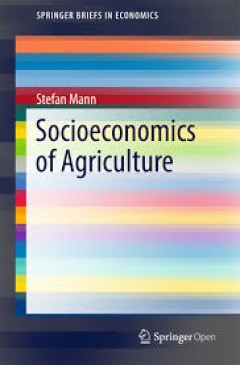
Socioeconomics of Agriculture
This open access book applies for the first time emerging concepts of socioeconomics to analyse an economic sector, namely agriculture. It considers the rational choices of all actors in the system (just as agricultural economists do) and their cultural preferences and constraints (just as rural sociologists do). Socioeconomic concepts are subsequently used to structure agricultural issues with…
- Edition
- -
- ISBN/ISSN
- 978-3-319-74141-3
- Collation
- VII, 106
- Series Title
- SpringerBriefs in Economics (BRIEFSECONOMICS)
- Call Number
- 338 MAN s

Megatrends in Agriculture, Food Industry and Food Markets : An Empirical and …
This book offers a research-based, holistic overview of the entire value chain of the global food industry. It captures and defines over 80 contemporary ‘megatrends’ in agriculture and the food market that can be empirically documented and have a major impact on business, economies, industries, societies, and individuals. Today the world is characterized by more uncertainty and unpredict…
- Edition
- 1
- ISBN/ISSN
- 9783031581526
- Collation
- XLV, 410 hlm; ill., lamp.,
- Series Title
- -
- Call Number
- -
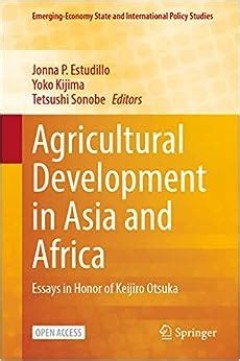
Agricultural Development in Asia and Africa: Essays in Honor of Keijiro Otsuka
This Open Access book explores the multifaceted nature of agricultural and rural development in Asia and examines the extent to which the Asian experience is being replicated in contemporary Africa. This volume compiles the works of top scholars who provided analyses and evidences from household-level surveys collected for many years in several parts of Asia and Africa. The most important findi…
- Edition
- 1
- ISBN/ISSN
- 9789811955426
- Collation
- XXXIII, 387hlm,: ill, lamp;
- Series Title
- -
- Call Number
- -

Transforming Food Systems for a Rising India
This open access book examines the interactions between India’s economic development, agricultural production, and nutrition through the lens of a “Food Systems Approach (FSA).” The Indian growth story is a paradoxical one. Despite economic progress over the past two decades, regional inequality, food insecurity and malnutrition problems persist. Simultaneously, recent trends in obesity …
- Edition
- 1
- ISBN/ISSN
- 978-3-030-14409-8
- Collation
- oer.unej.ac.id
- Series Title
- Palgrave Studies in Agricultural Economics and Food Policy
- Call Number
- 330
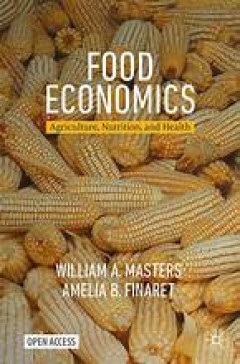
Food Economics
Food Economics provides a unified introduction to the economics of agricultural production, business decisions, consumer behavior, and the government policies that shape our food system. This open access textbook begins with economic principles derived using graphical techniques to explain and predict observed prices, quantities, and other outcomes as a result of individual choices influence…
- Edition
- 1
- ISBN/ISSN
- 978-3-031-53840-7
- Collation
- -
- Series Title
- Palgrave Studies in Agricultural Economics and Food Policy
- Call Number
- XXVII, 476

Resilience and Food Security in a Food Systems Context
This open access book compiles a series of chapters written by internationally recognized experts known for their in-depth but critical views on questions of resilience and food security. The book assesses rigorously and critically the contribution of the concept of resilience in advancing our understanding and ability to design and implement development interventions in relation to food securi…
- Edition
- 1
- ISBN/ISSN
- 978-3-031-23535-1
- Collation
- -
- Series Title
- Palgrave Studies in Agricultural Economics and Food Policy
- Call Number
- XXI, 413
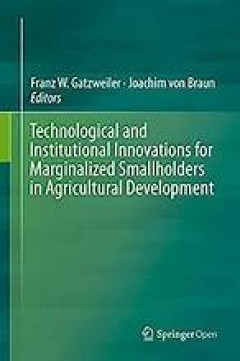
Technological and Institutional Innovations for Marginalized Smallholders in …
The aim of the book is to present contributions in theory, policy and practice to the science and policy of sustainable intensification by means of technological and institutional innovations in agriculture. The research insights re from Sub-Saharan Africa and South Asia. The purpose of this book is to be a reference for students, scholars and practitioners inthe field of science and policy for…
- Edition
- 1
- ISBN/ISSN
- 978-3-319-25718-1
- Collation
- -
- Series Title
- -
- Call Number
- XV, 435
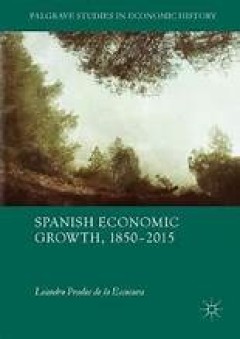
Spanish Economic Growth, 1850–2015
This book is open access under a CC BY 4.0 license. This text offers a comprehensive and nuanced view of the economic development of Spain since 1850. It provides a new set of historical GDP estimates for Spain from the demand and supply sides, and presents a reconstruction of production and expenditure series for the century prior to the introduction of modern national accounts. The author …
- Edition
- 1
- ISBN/ISSN
- 978-3-319-58042-5
- Collation
- -
- Series Title
- Palgrave Studies in Economic History
- Call Number
- XXIV, 383
 Computer Science, Information & General Works
Computer Science, Information & General Works  Philosophy & Psychology
Philosophy & Psychology  Religion
Religion  Social Sciences
Social Sciences  Language
Language  Pure Science
Pure Science  Applied Sciences
Applied Sciences  Art & Recreation
Art & Recreation  Literature
Literature  History & Geography
History & Geography